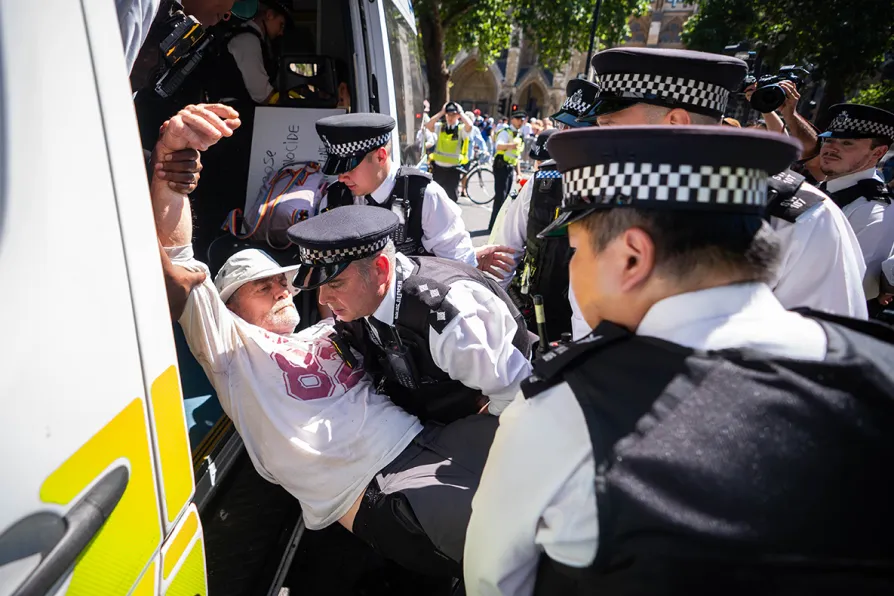
 Police officers remove a person after they took part in a protest in Parliament Square, London, to call for de-proscription of Palestine Action, July 12, 2025
Police officers remove a person after they took part in a protest in Parliament Square, London, to call for de-proscription of Palestine Action, July 12, 2025
MORE than 70 people were arrested on Saturday during protests demanding the reversal of a ban on Palestine Action.
Demonstrators held signs reading, “I oppose genocide. I support Palestine Action,” despite warnings from police that public displays of support could violate terrorism legislation.
Police made 42 arrests in London, 13 in Cardiff, 16 in Manchester and one in Leeds.
One sign-holder in Cardiff, Katarzyna Kruk, a civil servant, said: “As an immigrant with settled status and an employee of the Civil Service, I have a lot to lose personally by holding a simple sign.
“But I, and the world, have even more to lose if we do not stand up to injustice and imperialism.”
Another protester in London, Kris Welch, a retired special educational needs co-ordinator, said: “My father was in the Polish resistance and wanted by the Nazis and Russians.
“I grew up with the knowledge that there are some lines that cannot be crossed, and people have to stand up, whatever the consequences to them personally.
“I cannot stand by when a genocide is taking place, I cannot stand by while those who want to stop the genocide are branded as terrorists, and I cannot stand by while my government is actively complicit in the Palestinian genocide.”
Meanwhile in Scotland, a man was reportedly arrested for wearing a Scottish Palestine Solidarity Campaign T-shirt while leafleting near a music festival in Glasgow.
The shirt read: “Genocide in Palestine. Time to take action,” with the words “Palestine” and “Action” in a larger font.
Police arrested 29 people after they held signs supporting Palestine Action in London on July 5, the day the proscription came into force.
They were detained for around 12 hours before being released on bail without charge, said Defend Our Juries, which organised the action.
Since being designated a terror group, membership or support for Palestine Action is punishable by up to 14 years in prison.
Expression of support includes “chanting, wearing clothing or displaying articles such as flags, signs or logos,” Scotland Yard said.
Home Secretary Yvette Cooper announced plans to ban the group after members broke into RAF Brize Norton on June 20 and damaged two refuelling planes.
The group’s proscription is subject to a legal challenge, with the High Court set to consider an application for judicial review on July 21.

Home Secretary Cooper confirms plans to ban the group and claims its peaceful activists ‘meet the legal threshold under the Terrorism Act 2000’












